- Descriere
- Specificații
- Informații suplimentare
- Sfaturi practice
- Producător
- Recenzii (0)
Descriere
GUSTARD X30DAC 4x ES9039SPRO + ES9311Q XMOS XU216 Airplay 2 DLNA 32bit 768kHz DSD512 MQA
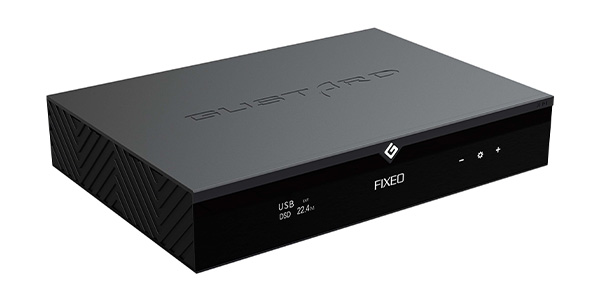
With its X30, Gustard unveils a DAC of exceptional performance and versatility. In fact, this DAC features no less than four ES9039SPRO DAC chips coupled with an ES9311Q linear regulator and a second-generation XU216 USB XMOS interface. This enables it to support high-resolution sampling rates up to PCM 32bit 768kHz, DSD512 and MQA. It also features a preamplifier stage with R2R volume control, as well as an Ethernet LAN port on an RJ45 connector, allowing it to double as a network player. There’s also an FPGA with OXCO crystal oscillators and a connector for an external 10MHz clock. The numerous digital and optical inputs include USB, Toslink optical, SPDIF coaxial, I2S via HDMI and a micro SD slot. Two 3.5mm jack triggers complete the package, and output is via stereo RCA or balanced stereo XLR. In terms of design and ergonomics, it features an attractive front panel display and elegant curves, plus a remote control for convenient operation from a distance. This makes the X30 an excellent choice as a sound gateway and a central element in your Hi-Fi system.
GUSTARD X30: XMOS XU216 USB interface and 4x DAC ES9039SPRO + ES9311Q
The Gustard X30 benefits from 4 ES9039SPRO DAC chips coupled with an ES9311Q linear regulator and an XU216 USB XMOS interface. This chip set enables it to support high-resolution streams up to PCM 32bit 768kHz, DSD512 and MQA. The ES9311Q ultra-low-noise linear regulator optimizes the work of the four DAC chips, achieving a dynamic range of over 130dB and an SNR of over 129dB. An analog Class A low-pass filter circuit based on discrete components offers flexibility in adjusting each parameter of the DAC chips, maximizing their performance.
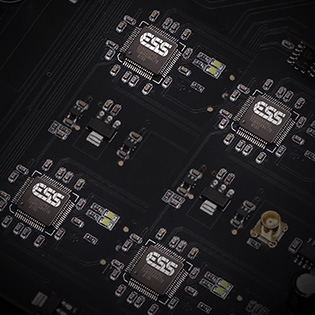
GUSTARD X30: digital filter
An autonomous DSP SHARC digital filter provides noise reduction thanks to a 64-bit floating-point algorithm and noise-shaping techniques. The X30 also features 4 DSD filters, 3 PCM filters and NOS mode support.

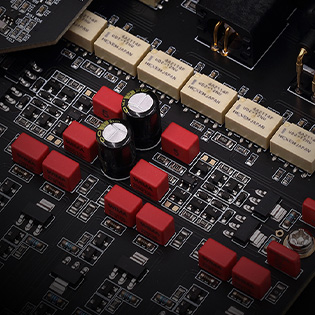
GUSTARD X30 : passive analog preamplifier
The preamplifier stage features R2R volume control for adjustment without loss of signal quality, and direct connection to a power amplifier or active speakers. A fixed output level is also available if you wish to connect the X30 to an external preamplifier.
GUSTARD X30: network player function
An Ethernet LAN RJ45 port enables the X30 to connect to the network and support Roon, Airplay, DLNA, UPnP, or NAA (Network Audio Adapter). Streaming platforms are thus accessible, notably via an interface developed with Celaudio. This interface has been specially designed to optimize sound rendering with devices combining hardware and software.
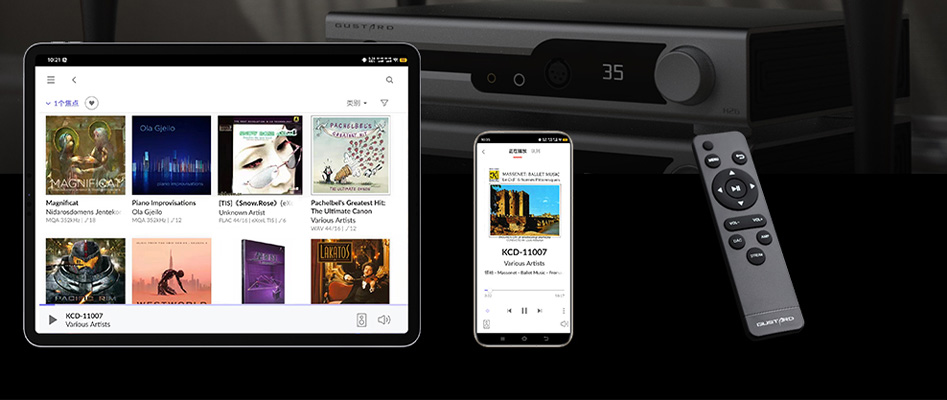
GUSTARD X30: a high-end clock system
The X30’s clock system features thermostatic OCXO crystal oscillators and a K2 synthesizer. This technology allows the DAC to use only its internal OXCO clock or an external 10MHz clock. The whole unit is accompanied by a FGPA chip for excellent stability.
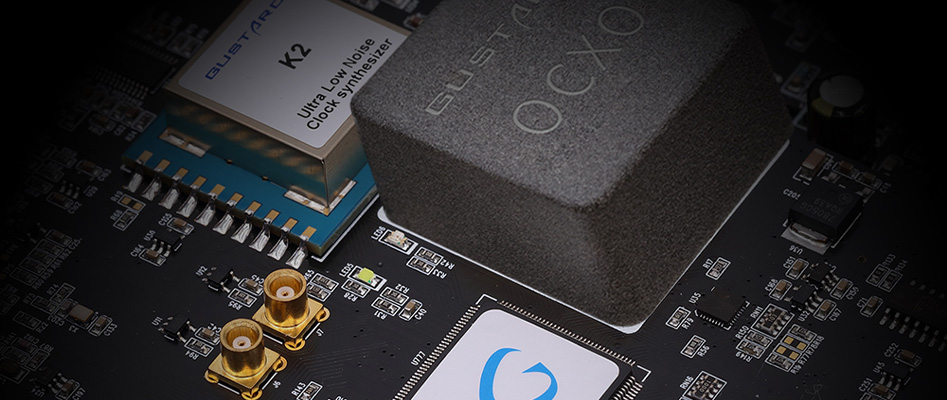
GUSTARD X30: balanced power supply stage
The X30 benefits from two toroidal transformers that supply the analog and digital parts of the device independently, to avoid any interference. In addition, the power supply for the two DAC channels is separate, with independent voltage stabilizers.
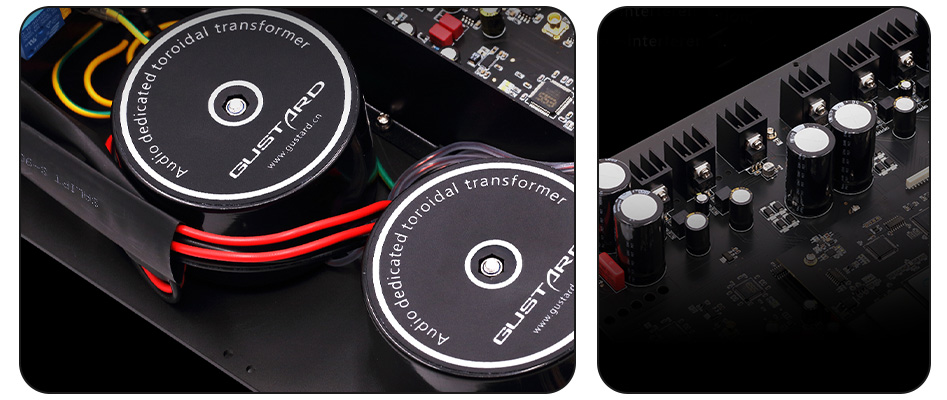
Gustard X30 overview
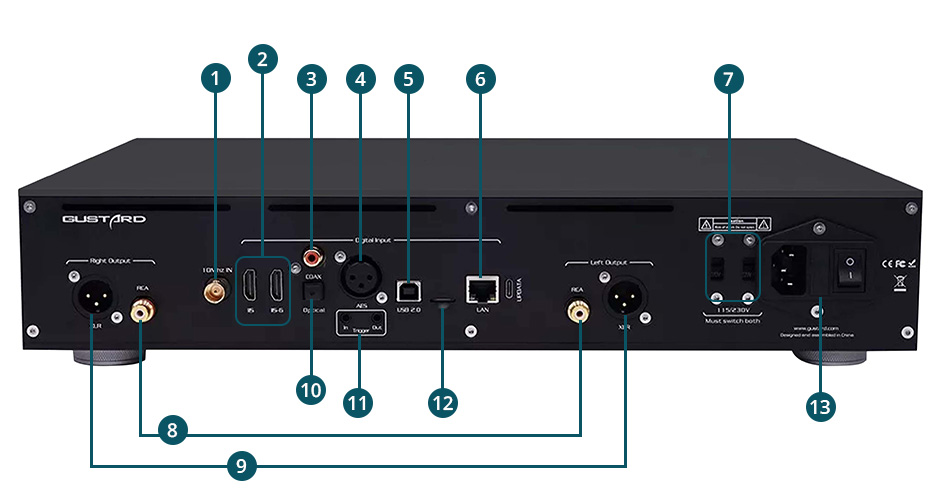
| 1 | 10MHz external clock BNC connector |
| 2 | 2x I2S via HDMI |
| 3 | SPDIF Coaxial input |
| 4 | AES/EBU input |
| 5 | USB-B input |
| 6 | RJ45 Ethernet port |
| 7 | 2x 110/230V AC mains switch |
| 8 | Stereo RCA output |
| 9 | Balanced stereo XLR output |
| 10 | Toslink optical input |
| 11 | Trigger IN/OUT |
| 12 | Slot SD |
| 13 | IEC power supply |
SPECIFICATIONS
Product type DAC
DAC chip 4x ES9039SPRO
Voltage regulator ES9311Q
USB interface XMOS XU216
Inputs 1x USB-B
1x SPDIF Coaxial
1x Optical Toslink
1x AES/EBU
2x I2S via HDMI
1x SD slot
Outputs 1x RCA stereo
1x XLR stereo balanced
Supported sample rates USB: PCM 32bit 768kHz, DSD DoP256, DSD512, MQA
SPDIF Coaxial, Toslink optical, AES/EBU: 16-24bit 192kHz, DSD DoP64, MQA
Trigger In / Out
External clock 10MHz via BNC connector (input impedance 50 ohm, 0dBm-20dBm)
CMOS square wave: 0.2V-3.3V
Sine wave: 0.5V-3.3V
Ethernet port LAN RJ45
LAN speed 100/1000Mpbs
Supported network protocols Roon, Airplay, UPnP, NAA
ANALOG OUTPUTS
Frequency response 20-20kHz (+/-0.2dB)
Dynamic range > 130dB
SNR > 129dB
Channels crosstalk -139dB @ 10kHz
THD+N < 0.0001% @ 1kHz
IMD 0.001% @ -1dbfs
RCA output level 2.5Vrms (fixed)
RCA output impedance 100 Ohm
XLR output level 5.1Vrms (fixed)
XLR output impedance 100 ohm
GENERAL
Power supply 115/230V AC 50/60Hz
Power consumption < 30
Informații suplimentare
| Producător | |
|---|---|
| Disponibilitate | La Comandă – Produsul se aduce la comandă in 3-6 zile! |
| Unitate Pret | Bucata |
PENTRU BOXE:
- Pentru performante optime este necesara pozitionarea boxelor la o distanta de minim 30-40cm de peretele din spate pentru boxele cu bass-reflex in spate, pentru cele cu bass-reflex in fata, recomandam pozitionarea la o distanta de 10-20cm fata de peretele din spate.
- Boxele vor ajunge sa functioneze in parametrii recomandati de producator, dupa minim 50 de ore (ideal 100 ore) de functionare la volum mediu. In aceasta perioada de timp, de “rodaj a boxelor”, sunetul va fi la inceput ceva mai artificial, bass-ul nu va fi inca controlat, inaltele rigide iar vocile usor retinute, pe masura ce boxele vor functiona, veti remarca cum bas-ul devine mai controlat, mai prezent si mai voluminos, vocile si sunetele medii devin naturale si mai echilibrate, iar inaltele devin rafinate si detaliate. Exista boxe care necesita un „rodaj” mai amplu de minim 300 de ore mai ales in cazul celor care au difuzoare de kevlar, carbon sau alte materiale de acest tip. Boxele care se „rodeaza” cel mai repede sunt cele care au difuzoare de celuloza.
PENTRU AMPLIFICATOARE, DAC-URI, PREAMPLIFICATOARE, RECEIVER STEREO & HOME CINEMA, SURSE DIGITALE AUDIO-VIDEO:
- Pentru performante optime este necesar „rodarea” echipamentului, In functie de complexitatea componentelor din aparatul dumneavoastra acesta poate dura intre 30-200 ore.
- Rodajul se face la volum minim, fiind astfel suficient faptul ca acesta este alimentat corect conform manualului de utilizare la 220-230 Volti si trece semnal audio sau video dupa caz prin el.
- Echipamentul supus „rodajului” va ajunge sa functioneze in parametrii recomandati de producator, dupa perioada mai sus mentionata. In aceasta perioada de timp, de “rodaj”, sunetul va fi la inceput ceva mai artificial, bass-ul nu va fi inca controlat, inaltele rigide iar vocile usor retinute, pe masura ce echipamentul va functiona, veti remarca cum bas-ul devine mai controlat, mai prezent si mai voluminos, vocile si sunetele medii devin naturale si mai echilibrate, iar inaltele devin rafinate si detaliate.
PENTRU CABLURI:
- Pentru performante optime este necesara „rodarea” cablurilor, In functie de complexitatea conductorului folosit, cat si geometriei acestuia, „rodajul” poate dura intre 30-100 ore.
- Rodajul se face la volum minim, fiind astfel suficient faptul ca va trece semnal audio sau video dupa caz prin el.
- Cablul supus „rodajului” va ajunge sa functioneze in parametrii recomandati de producator, dupa perioada mai sus mentionata. In aceasta perioada de timp, de “rodaj”, sunetul va fi la inceput ceva mai artificial, pe masura ce cablul va functiona, veti remarca cum bas-ul devine mai controlat, mai prezent si mai voluminos, vocile si sunetele medii devin naturale si mai echilibrate, iar inaltele devin rafinate si detaliate.
Pentru detalii privind aceste aspecte de rodaj si nu numai, va rugam sa ne consultati!













Recenzii
Nu există recenzii până acum.